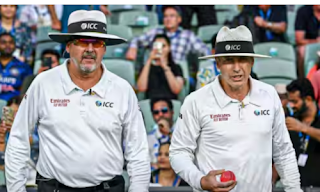%20(500%20%C3%97%20280%20px)%20(500%20x%20300%20px)%20(21).png)
Key Improvements
a) Loss of a review
b) 5-run penalty
c) Free hit in the next over
d) Suspension of captain for one over
Answer: b) The "stop clock" rule enforces a 5-run penalty after two warnings if the fielding team exceeds 60 seconds between overs.
- Stop Clock in Tests: Fielding teams must start a new over within 60 seconds; after two warnings, a 5-run penalty applies. The clock resets every 80 overs.
- ODI Ball Rule: From the 35th over, only one ball (of the two used) will continue, reviving reverse swing and balancing bat-ball dynamics.
- DRS Expansion: If a batter is given out caught and reviews it, LBW can now be checked even if not originally appealed. “Umpire’s call” still results in dismissal.
- Boundary Catch Rule: Airborne fielders must land and remain inside the boundary after touching the ball. Only one airborne contact is allowed outside the field.
- Concussion Substitutes: Teams must pre-nominate five like-for-like replacements (batter, keeper, seamer, spinner, all-rounder).
- Saliva Rule Relaxed: Saliva use is still banned, but ball change is no longer mandatory unless the ball is significantly altered.
- Deliberate Short Runs: Penalized with 5 runs, and the fielding team chooses the next striker.
- DRS Review Order: In multiple appeals (e.g., LBW + run-out), events are reviewed chronologically, not by umpire priority.
Question:
Q.1 What is the penalty for a fielding team failing to start a new over within 60 seconds in Tests after two warnings?a) Loss of a review
b) 5-run penalty
c) Free hit in the next over
d) Suspension of captain for one over
Answer: b) The "stop clock" rule enforces a 5-run penalty after two warnings if the fielding team exceeds 60 seconds between overs.

